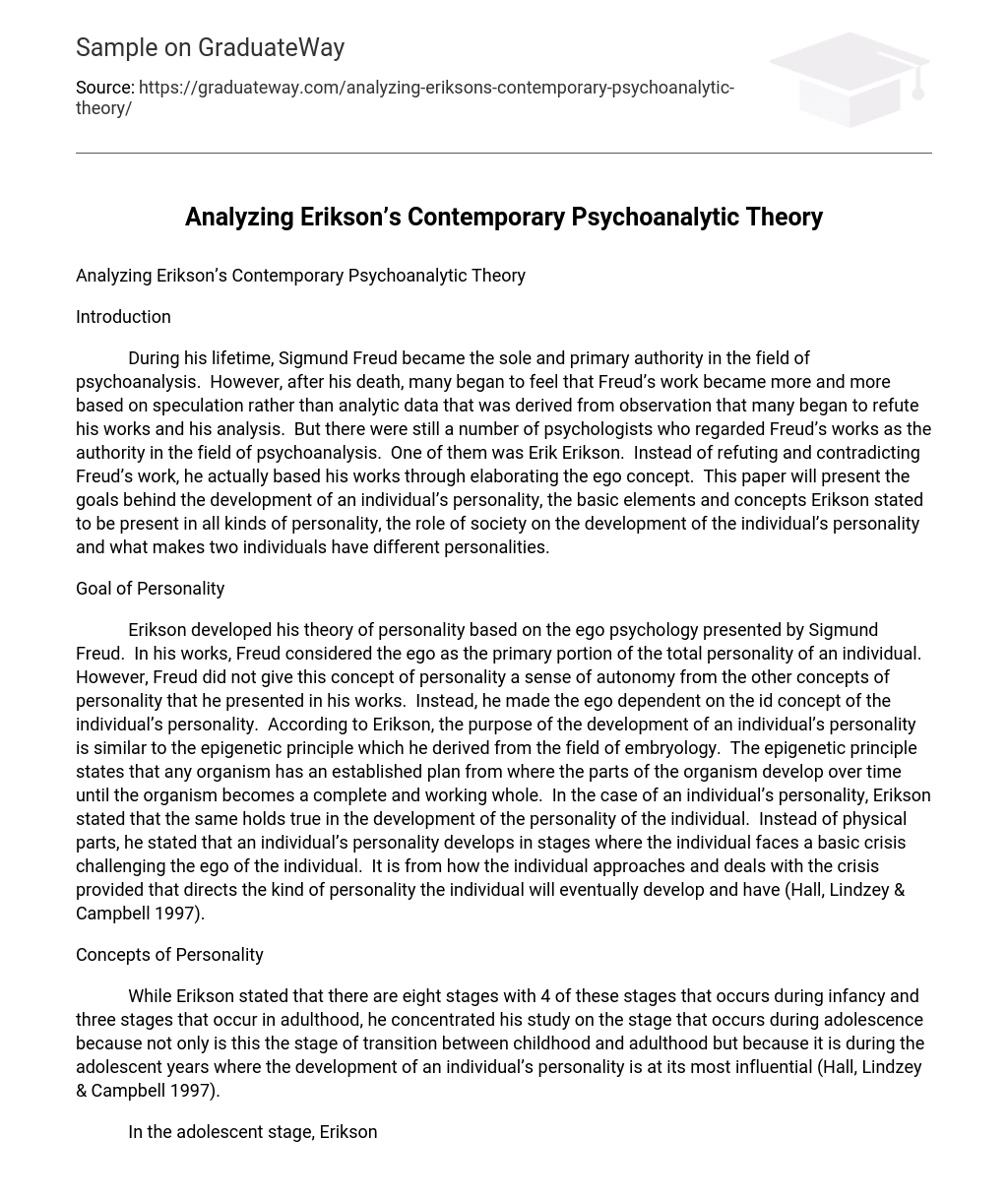Introduction
During his lifetime, Sigmund Freud became the sole and primary authority in the field of psychoanalysis. However, after his death, many began to feel that Freud’s work became more and more based on speculation rather than analytic data that was derived from observation that many began to refute his works and his analysis. But there were still a number of psychologists who regarded Freud’s works as the authority in the field of psychoanalysis. One of them was Erik Erikson. Instead of refuting and contradicting Freud’s work, he actually based his works through elaborating the ego concept. This paper will present the goals behind the development of an individual’s personality, the basic elements and concepts Erikson stated to be present in all kinds of personality, the role of society on the development of the individual’s personality and what makes two individuals have different personalities.
Goal of Personality
Erikson developed his theory of personality based on the ego psychology presented by Sigmund Freud. In his works, Freud considered the ego as the primary portion of the total personality of an individual. However, Freud did not give this concept of personality a sense of autonomy from the other concepts of personality that he presented in his works. Instead, he made the ego dependent on the id concept of the individual’s personality. According to Erikson, the purpose of the development of an individual’s personality is similar to the epigenetic principle which he derived from the field of embryology. The epigenetic principle states that any organism has an established plan from where the parts of the organism develop over time until the organism becomes a complete and working whole. In the case of an individual’s personality, Erikson stated that the same holds true in the development of the personality of the individual. Instead of physical parts, he stated that an individual’s personality develops in stages where the individual faces a basic crisis challenging the ego of the individual. It is from how the individual approaches and deals with the crisis provided that directs the kind of personality the individual will eventually develop and have (Hall, Lindzey & Campbell 1997).
Concepts of Personality
While Erikson stated that there are eight stages with 4 of these stages that occurs during infancy and three stages that occur in adulthood, he concentrated his study on the stage that occurs during adolescence because not only is this the stage of transition between childhood and adulthood but because it is during the adolescent years where the development of an individual’s personality is at its most influential (Hall, Lindzey & Campbell 1997).
In the adolescent stage, Erikson presented three general concepts. The first is the identity of the individual. This when the person begins to become aware of the individual characteristics that are considered innate such as his or her likes and dislikes, goals for the future and his or her strength and purpose to control one’s destiny. The second concept is the identity confusion. Since the adolescent period is actually a transition, while the identity of the individual develops, the individual may tend to suffer from a confusion of his or her role in society, which would cause the adolescent developing feelings of isolation, emptiness, anxiousness and indecisiveness. This would eventually make them feel that they are not developing as they should and would be prone to retreat to becoming a child. The last concept is the identity crisis which refers to the necessity of the individual to resolve any failures in transition which have led to a confusion of identity roles. Among the three concepts, this is the most crucial since if any confusion and failures are not resolved, this could lead to the development of a negative identity which the individual would possess bad or unworthy characteristics as far as society is concerned (Hall, Lindzey & Campbell 1997).
Role of Society in Personality
In Erikson’s theory of personality, society plays a crucial role in the development of an individual’s personality. When an individual begins to suffer from confusion of his or her roles in society, he or she would eventually feel that society is pressuring him or her to make decisions which lead him or her to become more and more resistant to the pressures that arise from society’s standards. This would result in the individual becoming deeply concerned on how other people view them leading them to experience feelings of self-consciousness and embarrassment as well as the individual developing a negative identity by projecting these negative characteristics to others (Hall, Lindzey & Campbell 1997).
What Makes Personalities Different
The difference in the personalities of two individuals lies on how the individual’s ability to resolve the crises and confusion in roles that they experience in society as they develop. This is because, as Erikson mentioned, if the adolescent feels that he or she is not able to cope with the pressures of society and resolve of his or her confusion in his or her identity, they would eventually feel that they are regressing instead of progressing. As such, they would develop either personality traits which adults would consider as childish, or would even result to the development of deviant personality behaviors (Hall, Lindzey & Campbell 1997).
Conclusion
Unlike Freud’s theory of personality, Erikson’s theory further explains as to why personalities continuously develop and change as an individual grows. There are many instances where an individual may have been an extrovert at one point in his or her life and then become an introvert in the next moment. The factors that may cause these erratic changes have been clarified by Erikson’s theories. More importantly, his theories have explained the erratic changes in the personality of adolescents.
Reference
Hall, C. S., Lindzey, G. & Campbell, J. B. (1997). Theories of personality, 4th ed. New
Jersey: John Wiley & Sons.





